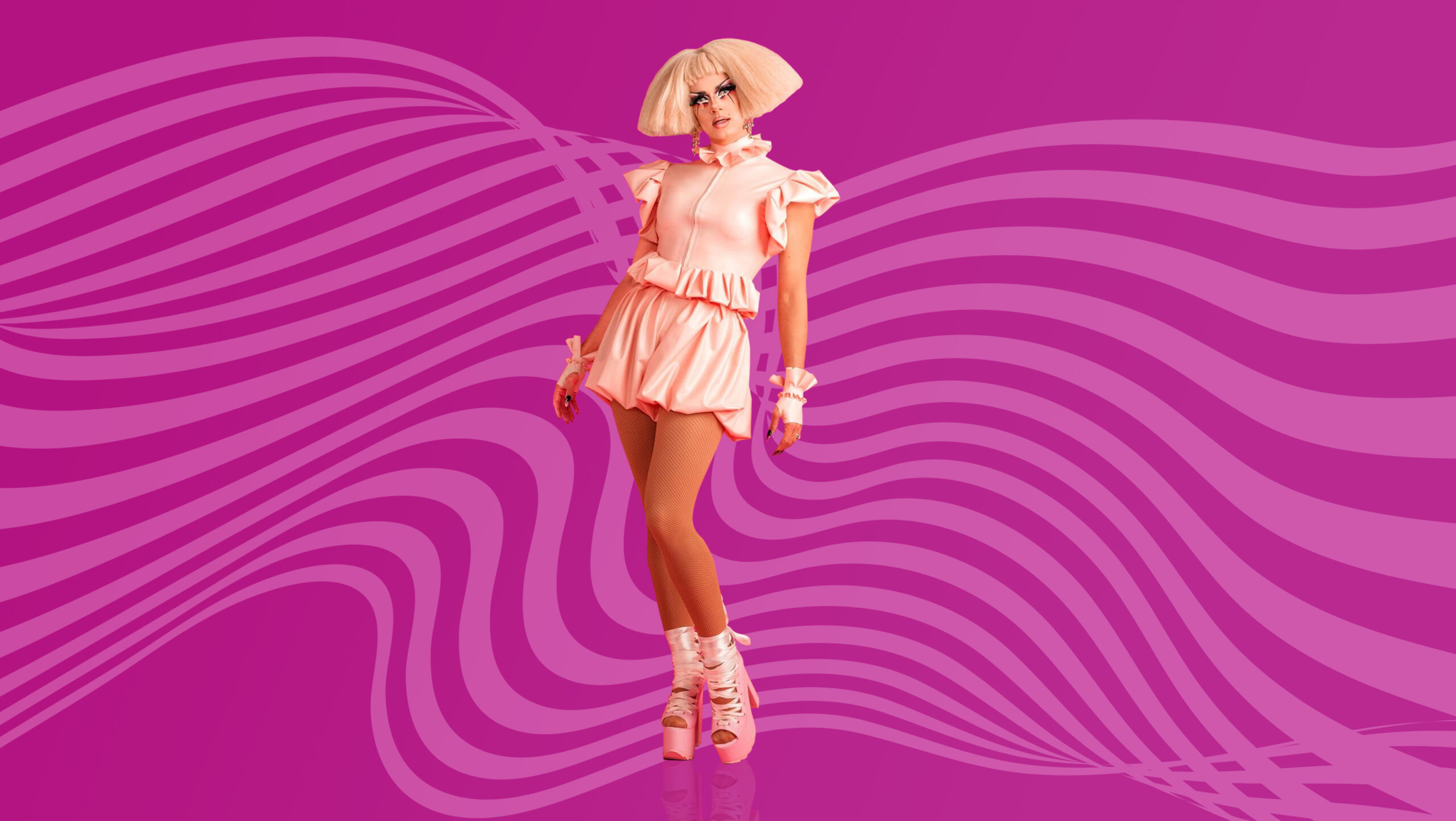RuPaul’s Drag Race may have jumped across the pond, but the rise of Canadian queens isn’t in short supply.
Crystal is the latest in a number of Canadian queens taking over reality TV drag competitions. She joins the ranks of Brooke Lynn Hytes from Season 11 of RuPaul’s Drag Race and Toronto-based Yovska on Season 3 of Boulet Brothers Dragula.
And for once, Crystal is the queen in the room with the accent.
Xtra reached out to Crystal to talk about Canada’s east coast, U.K. drag and her fellow British contestants.
How does it feel to be on the first edition of RuPaul’s Drag Race UK?
It feels so casual, like a normal day—but actually it’s crazy, it’s the most insane thing that’s ever happened to me in my life!
I think RuPaul is obsessed with British queens, even though he’s only understood about 50 to 70 percent of what everyone is saying. He loves learning new jokes and new crude phrases.
Not a lot of people know you’re from Canada. Tell me about your upbringing here.
I was born in Newfoundland, and I grew up in Nova Scotia. But my mom is from the U.K., so I’ve always had a connection. I was over there a lot growing up, and then I moved here 10 years ago. I hadn’t even considered the idea of being a drag queen when I moved here. I just did that thing that gays do where they try and make it in the big city and try to find their fame and fortune.
I was watching the first runway on the show, “Hometown Hero,” and you call yourself “the bitch from Shoreditch.” Tell me a bit about your style of drag.
I started doing drag in East London, which is the creative hub of the city. That’s where all the hipsters live. So I started doing drag around queens like that, and drag queens in East London are very much like, “I’m in a club, I’m sat on the bar, I’m probably shitfaced, I’ve been there for 10 hours, I’ll probably still be there Monday morning.” It’s not polished or pretty, but entertaining and cool. Those are the queens I was seeing when I started doing drag, and that’s what shaped my style and my aesthetic. It’s fashion, punk and a little bit pretentious.
Something like an ’80s supervillain, right?
Yeah, the references that inspire my drag are all nerdy things from my childhood: ’80s films, campy ones, superheros, Bond movies—all of that high camp femme fatale. When I started drag it was kind of natural that that was what Crystal became—this over-the-top, sexed-up femme fatale.
If I was to go to a show, what could I expect to see from Crystal?
I like to do stunts and things you haven’t seen a drag queen do before. I do angle grinding, which is shooting sparks out of my crotch. I’ll put a cigarette out with my tongue. And I do aerial circus—so you’ll see me hanging from the ceiling in stilettos doing a lip sync, drops, being a bit extra. I like being extra.
How does the drag in East London compare to the rest of the U.K.?
You’ve heard Charlie Hydes from Season 8 say previously that U.K. queens often sing live. And that’s mostly true across the country, but not so much the case for East London. Around the U.K., there’s a big tradition of drag being a cabaret art form, which includes more telling jokes and singing a song. That’s versus in the U.S., where it’s based around ball culture, competition and look and lip syncs.
There’s this kind of thing when people think of your typical British drag queen: This fat, 60-year-old man with blue eyeshadow up to her forehead, in a sequined gown telling jokes in Blackpool. It’s this old-school tradition, and that’s what’s kind of cool about the U.K. scene. There have been a bunch of stars who have gone mainstream and drag is this real part of pantomime, which is a show everyone goes to a Christmas. There are always drag queens in it, so basically everyone in the U.K. has seen a drag queen at some point—and in North America drag is really only in gay bars.
Now that we see the explosive impact Drag Race has in North America, how do you see Drag Race UK affecting the scene here?
Now we’ve gone from being the same as everyone else to being the head bitches in charge. I think people are going to have to start seeing the U.K. scene through a different lens, which they’ve never had to do before. I don’t think the change will be too dramatic; we’ve already had the same impact that the rest of the world has. It’ll just give people a chance to have some local heroes.
How do you think viewers outside the U.K. are going to receive U.K. drag?
I mean, they’re going to love it, aren’t they? Even with the first episode, I hope I proved that we mean business. And they’d better pay attention, because we’re going to shake it up.
In the leadup to Drag Race UK, some local queens expressed concern about the imposition of an American competition on U.K. drag. What do you say to that as a participant on the show?
I think that impact has already happened, because every person in the U.K. already watches Drag Race. Now that there are U.K. queens on the show, people can tell that this isn’t just a show for American-style queens. If anything, it’s showcasing what the U.K. does well—so I think those fears are unfounded.
What I can say is that Drag Race has created an industry, and the only reason I could work full-time as a queen before getting on the show is because of Drag Race. It’s given shedloads of people gigs and bookings, and that probably wouldn’t have happened if it wasn’t for Drag Race.
I think it’s important to see different kinds of drag. And I feel the problem nowadays is people look to Drag Race as the only way to do drag, as if it’s the gospel. But one show can be everything for every person.
Do you think you’ll be coming back to Canada soon?
Book me! And absolutely. I’m trying to come back in December—I’d love to do a mini-tour.
This interview has been edited for length and clarity.


 Why you can trust Xtra
Why you can trust Xtra


